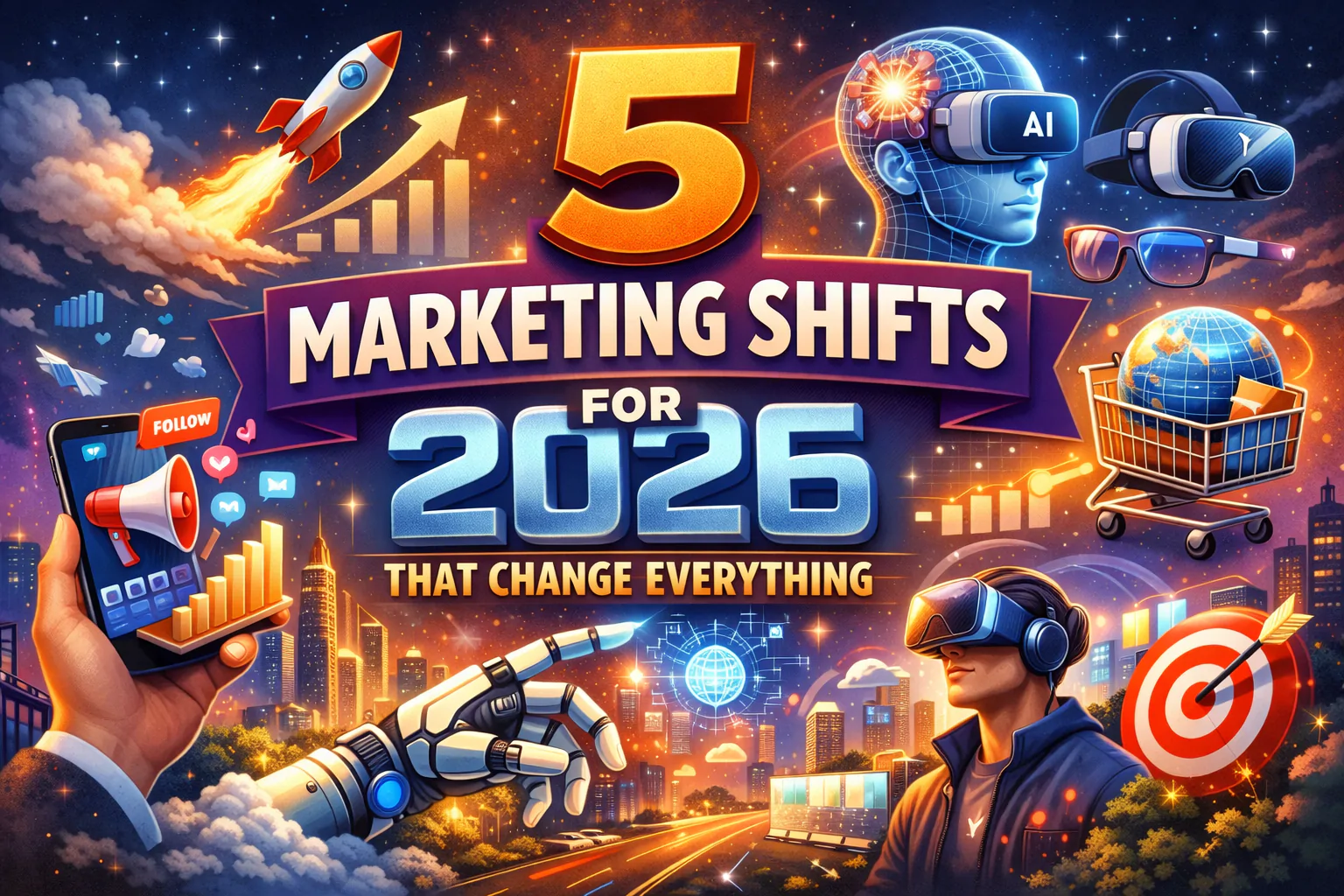In a world where noise is deafening, how do you make your startup or small business heard?
In the bustling marketplace, where countless voices vie for attention, it can be daunting to know how to make your startup or small business stand out. The traditional methods of promotion can be expensive and ineffective, leaving you feeling like you’re shouting into a void.
But there is hope.
Digital marketing offers a powerful and cost-effective way to reach your target audience and achieve your business goals. By harnessing the power of the internet, you can connect with potential customers on a deeper level, build relationships, and drive growth.
Digital marketing is not just about selling products or services. It’s about building a brand, creating a community, and telling your story.
It’s about giving people a reason to care about your business.
If you’re ready to take your startup or small business to the next level, here are a few ways you can use digital marketing to achieve your goals:
- Create a strong online presence :
- In today’s digital world, your website is your storefront. It’s the first impression potential customers will have of your business, so it’s important to make sure it’s well-designed, informative, and engaging.
- Your website should be easy to navigate and provide visitors with all the information they need to learn about your business. Make sure your website is mobile-friendly, as more and more people are using their smartphones and tablets to access the internet.
- Build a strong social media presence
- Social media is a powerful tool for connecting with potential customers and building relationships. By creating engaging and informative content, you can attract followers and encourage them to learn more about your business.
- Be sure to interact with your followers by responding to comments and questions. This will help you build relationships and create a sense of community around your brand.
- Create high-quality content
- Content is king when it comes to digital marketing. By creating high-quality, informative, and engaging content, you can attract visitors to your website and establish yourself as a thought leader in your industry.
- There are many different types of content you can create, such as blog posts, infographics, videos, and e-books. Be sure to create content that is relevant to your target audience and that will provide them with value.
- Promote your content
- Once you’ve created great content, it’s important to promote it so that people can find it. You can promote your content through social media, email marketing, and paid advertising.
- Track your results
- It’s important to track your digital marketing results so that you can see what’s working and what’s not. This will help you refine your strategies and improve your results over time.
- Digital marketing can be a powerful tool for promoting your startup or small business. By following these tips, you can reach a wider audience, build relationships, and drive growth.
But remember, digital marketing is not a quick fix. It takes time and effort to build a successful online presence. So be patient, be consistent, and be creative. And most importantly, never give up on your dreams.
The Emotional Side of Digital Marketing
In the realm of digital marketing, it’s easy to get caught up in the technical aspects of things. We talk about algorithms, keywords, and conversion rates. We obsess over metrics and data.
But what about the human element? What about the emotional connection that businesses can forge with their audience through digital marketing?
The truth is, digital marketing is just as much about emotion as it is about logic. After all, we’re not just selling products or services. We’re selling dreams, aspirations, and solutions to problems.
When we tap into the emotional needs of our audience, we’re able to create a deeper connection with them. We’re able to make them feel something. And when they feel something, they’re more likely to remember us.
Here are a few examples of how businesses can use digital marketing to connect with their audience on an emotional level:
- Tell stories. People are naturally drawn to stories. They help us to understand the world around us and to connect with others on a deeper level. When you tell stories in your marketing, you’re able to tap into the emotional side of your audience.
- Be authentic. People can spot a fake from a mile away. When you’re authentic in your marketing, you’re able to build trust with your audience. They’ll be more likely to believe in what you have to say and to connect with you on a personal level.
- Be human. Don’t be afraid to show your personality in your marketing. Let your audience see the real you. They’ll be more likely to relate to you and to connect with you on a human level.
When you use digital marketing to connect with your audience on an emotional level, you’re creating a more powerful and lasting impression. You’re not just selling them something. You’re giving them a reason to care.
The Power of Emotion
Emotion is a powerful motivator. It can drive people to take action, to make decisions, and to change their behavior.
When we’re able to connect with our audience on an emotional level, we’re able to tap into their deepest desires and fears. We’re able to make them feel something. And when they feel something, they’re more likely to take action.
So don’t be afraid to use emotion in your digital marketing. Tap into the hopes, dreams, and fears of your audience. Make them feel something. And when you do, you’ll be well on your way to building a successful business.
Connect with your audience on a deeper level
In a world that is increasingly saturated with information, it is more important than ever to find ways to cut through the noise and connect with your audience on a deeper level.
Digital marketing offers a unique opportunity to do just that. By harnessing the power of storytelling, emotion, and empathy, you can create marketing campaigns that are both engaging and persuasive.
When you tell stories, you are able to tap into the universal human need for connection. Stories allow us to see the world through the eyes of others, to experience their joys and sorrows, and to learn from their triumphs and failures.
By sharing stories that are relevant to your brand, you can create a sense of shared identity with your audience. You can help them to see themselves in your brand, and to understand the values that you stand for.
Emotion is another powerful tool that can be used to connect with your audience. When you are able to evoke positive emotions, such as joy, hope, or inspiration, you create a positive association with your brand.
This positive association can make it more likely that your audience will remember your brand and consider doing business with you.
Empathy is the ability to understand and share the feelings of another person. When you are able to demonstrate empathy, you show your audience that you care about them and that you understand their needs.
This can create a sense of trust and connection, which can be invaluable in building long-term relationships with customers.
By using storytelling, emotion, and empathy in your digital marketing, you can create campaigns that are both engaging and persuasive. You can connect with your audience on a deeper level, and you can build relationships that will last a lifetime.
So, how can you use these principles to create more effective digital marketing campaigns?
- Focus on the human element. When you are creating marketing materials, think about the people who will be seeing them. What are their hopes, dreams, and fears? What are their pain points? How can your product or service help them?
- Be authentic. People can spot a fake from a mile away. When you are genuine and transparent in your marketing, you will build trust with your audience.
- Tell stories. Stories are a powerful way to connect with people on an emotional level. When you share stories about your customers, your employees, or your own experiences, you will create a more lasting impression.
- Be mindful of your tone. The tone of your marketing materials can have a big impact on how people perceive your brand. Use a tone that is consistent with your brand values, and that is appropriate for your target audience.
- Be consistent. The key to building relationships is consistency. Show up for your audience on a regular basis, and provide them with valuable content.
By following these tips, you can create digital marketing campaigns that are both engaging and persuasive. You can connect with your audience on a deeper level, and you can build relationships that will last a lifetime.
The Unsung Hero of Digital Marketing: Empathy
In the bustling realm of digital marketing, where attention spans are fleeting and competition is fierce, it’s easy to overlook one of the most powerful tools at our disposal: empathy.
Empathy is the ability to understand and share the feelings of another person. It’s about seeing the world through their eyes, feeling their joys and sorrows, and understanding their hopes and fears.
In the context of digital marketing, empathy allows us to connect with our audience on a deeper level. It helps us to understand their needs, wants, and pain points. And when we understand our audience, we can create more relevant, engaging, and persuasive marketing messages.
Here are a few ways that empathy can be used to enhance digital marketing efforts:
- Creating buyer personas
- Buyer personas are fictional representations of your ideal customers. By taking the time to develop buyer personas, you can gain a deeper understanding of your target audience. This includes understanding their demographics, psychographics, and behaviors.
- When you create buyer personas with empathy, you’re not just creating a list of facts and figures. You’re creating a living, breathing person with hopes, dreams, and fears. This allows you to connect with your audience on a more personal level.
- Crafting compelling content
- When you understand your audience’s needs, wants, and pain points, you can create content that is more likely to resonate with them. This could be blog posts, social media content, or even email marketing campaigns.
- By crafting content that is relevant and engaging, you can attract and retain a loyal following. And when you have a loyal following, you have a built-in audience for your products or services.
- Developing targeted advertising
- Empathy can also be used to develop more targeted advertising campaigns. When you understand your audience’s motivations, you can create ads that are more likely to capture their attention.
- For example, if you know that your target audience is concerned about saving money, you can create ads that highlight the cost-saving benefits of your products or services. Or, if you know that your target audience is looking for a sense of community, you can create ads that emphasize the social aspects of your brand.
- Providing excellent customer service
- Empathy is also essential for providing excellent customer service. When you’re able to understand and empathize with your customers’ concerns, you’re more likely to be able to resolve their issues in a way that is both helpful and satisfying.
In the digital age, customer service is more important than ever before. Customers are quick to share their negative experiences online, so it’s important to make sure that they have positive interactions with your brand.
By using empathy in your digital marketing efforts, you can create a more positive and engaging experience for your audience. This can lead to increased brand loyalty, customer satisfaction, and ultimately, increased sales.
So next time you’re planning a digital marketing campaign, take a moment to consider the role of empathy. By putting yourself in your audience’s shoes, you can create more effective and persuasive marketing messages that will resonate with them on a deeper level.
The ROI of Empathy in Digital Marketing
In the world of business, it’s all about the bottom line. Every decision is made with a keen eye on return on investment (ROI). So, how does empathy factor into the ROI equation for digital marketing?
The truth is, empathy can have a significant impact on your bottom line. Here are a few ways:
- Increased brand loyalty
- When customers feel understood and cared for, they are more likely to become loyal to your brand. This means they are more likely to repeat business and to recommend your brand to others.
- Improved customer satisfaction
- When customers feel that you understand their needs, they are more likely to be satisfied with their experience. This means they are less likely to churn and more likely to leave positive reviews.
- Increased sales
- When customers feel a connection with your brand, they are more likely to buy from you. This is because they are more likely to trust you and to believe that you have their best interests at heart.
In addition to these direct benefits, empathy can also lead to a number of indirect benefits, such as:
- Reduced customer service costs
- When customers feel understood, they are less likely to contact customer service. This is because they are more likely to be able to find the information they need or to resolve their issues on their own.
- Improved employee morale
- When employees feel that their company is empathetic, they are more likely to be engaged and motivated. This can lead to increased productivity and creativity.
- Enhanced brand reputation
- When a company is known for being empathetic, it is more likely to be seen as a positive and trustworthy brand. This can lead to increased media coverage and positive word-of-mouth.
So, how can you measure the ROI of empathy?
While it can be difficult to quantify the exact impact of empathy on your bottom line, there are a few metrics you can track to get a sense of its effectiveness. These include:
- Net Promoter Score (NPS)
- Customer satisfaction (CSAT) score
- Customer lifetime value (CLV)
- Churn rate
- Brand awareness
- Brand reputation
By tracking these metrics over time, you can see how empathy is impacting your business. And as you see the positive results, you’ll be able to make a strong case for investing in empathy as a key part of your digital marketing strategy.
In a world that is increasingly driven by data and technology, it’s easy to forget the importance of human connection. But the truth is, empathy is more important than ever before. By using empathy in your digital marketing, you can create a more positive and engaging experience for your audience. And when you do, you’ll be well on your way to building a successful business.
The Emotional Resonance of Digital Marketing
In the ever-evolving landscape of digital marketing, it is crucial to recognize the significance of emotional resonance. While captivating visuals and persuasive copy can undoubtedly grab attention, it is the ability to evoke emotion that truly leaves a lasting impression.
Digital marketing has the unique power to tap into the depths of human emotion, transcending the limitations of physical interaction. Through carefully crafted messages and engaging storytelling, brands can forge deep connections with their audience, fostering a sense of understanding and empathy.
When a brand successfully resonates with its audience on an emotional level, it creates a sense of relatability and trust. This, in turn, drives engagement and encourages action. People are more likely to remember brands that make them feel something, and they are more likely to support brands that they feel a connection with.
There are numerous ways for brands to utilize digital marketing to evoke emotion. Here are a few examples:
- Storytelling: Stories have the power to transport us to other worlds, allowing us to experience the joys, sorrows, and triumphs of others. By sharing stories that are relevant to their audience, brands can create a sense of shared experience, fostering a sense of connection.
- Humor: Humor can be a powerful tool for disarming audiences and creating a sense of lightheartedness. When used effectively, humor can make brands more relatable and approachable, encouraging engagement.
- Nostalgia: Nostalgia can evoke powerful emotions, reminding us of simpler times and happier moments. By tapping into the power of nostalgia, brands can create a sense of warmth and familiarity, fostering a sense of connection with their audience.
- Inspiration: Inspirational content can motivate and uplift audiences, leaving them feeling hopeful and empowered. By sharing inspiring stories and messages, brands can position themselves as a source of positivity and encouragement.
- Social responsibility: Demonstrating a commitment to social responsibility can make brands more appealing to consumers. By aligning themselves with causes that are important to their audience, brands can create a sense of shared values, fostering a sense of connection.
By tapping into the power of emotion, digital marketing can be a powerful tool for building brand loyalty and driving engagement. When brands are able to make their audience feel something, they create a lasting impression that is more likely to lead to action.
In a world that is increasingly saturated with information, it is more important than ever for brands to find ways to connect with their audience on a deeper level. By utilizing the emotional resonance of digital marketing, brands can create meaningful connections that will last a lifetime.
The Lingering Echo of Emotion in Digital Marketing
In the realm of digital marketing, where fleeting impressions reign supreme, it is easy to overlook the lingering echo of emotion. Like a ripple in a pond, the impact of an emotionally resonant message extends far beyond its initial splash.
When a brand is able to evoke a strong emotional response in its audience, it creates a lasting impression that is not easily forgotten. This impression lingers in the mind, subtly influencing perceptions and behaviors long after the initial encounter.
For example, a humorous ad campaign may leave viewers with a positive association with the brand, making them more likely to consider it when making a purchase. Or, a heartwarming story may evoke feelings of empathy and compassion, leading viewers to support the brand’s social initiatives.
The lingering echo of emotion can also manifest itself in more subtle ways. For instance, a brand that is perceived as being trustworthy or reliable is more likely to be chosen over a competitor, even if the competitor offers a similar product or service.
In a world that is increasingly driven by data and analytics, it is important to remember that emotion is still a powerful motivator. By understanding the emotional impact of their messages, brands can create more effective and engaging marketing campaigns that will resonate with their audience on a deeper level.
So, the next time you are crafting a digital marketing message, take a moment to consider the emotional impact it is likely to have. Ask yourself: what feelings do I want to evoke in my audience? How will these feelings influence their perceptions of my brand?
By carefully considering the emotional dimension of your marketing, you can create messages that will not only capture attention, but also leave a lasting impression. And in the ever-evolving landscape of digital marketing, it is the brands that are able to connect with their audience on an emotional level that will ultimately succeed.







